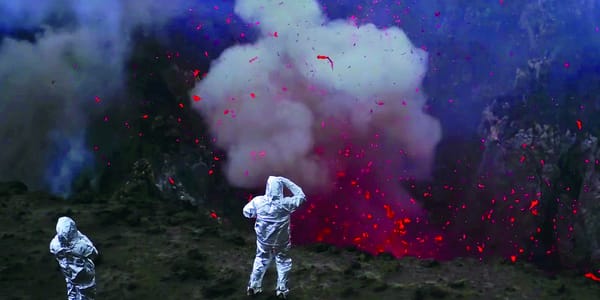Arrival
Arrival presents us with an alien invasion scenario where communication, not confrontation, is the order of the day. The result is an intelligent, nuanced science fiction film, the blockbuster debut of Canadian director Denis Villeneuve

At some point during their time at school, children will inevitably be asked to describe something in simple enough terms that even an alien, having just arrived on Earth, would understand. Like much of what is taught at school, this exercise is completely detached from reality. It assumes that another intelligent life form would speak, that it would communicate in a language structured similarly to ours, and that it would understand the concepts we use to express ourselves. Language is essentially meaningless without shared experience or points of reference, and as humans we are only able to communicate across languages (and translate them) because we all experience and interact with the world in a relatively similar way.
Noam Chomsky, “the father of modern linguistics”, even theorised that the structure of human language is biologically determined in our mind and a ‘universal grammar’ (a sort of inborn understanding of how to form sentences) exists. So while we might be able to communicate on first contact with a community living in an unexplored part of our own planet, trying to understand and deliver a message to an alien life form would be a monumental task.
In Denis Villeneuve’s Arrival, the extra-terrestrials that visit Earth communicate in a way completely unfamiliar to humans. Faced with the unknown, humanity attempts to understand the motivation of their visitors, who touch down across twelve landing sites around the globe. The story is far removed from the typical alien invasion blockbuster; it focuses on the complex process of translating a foreign language that no other human on Earth understands. We follow this translation process from the perspective of linguist Dr. Louise Banks (Amy Adams), an academic who quickly adapts to life on a military camp stationed close to one of the alien spacecrafts. Banks works closely with Ian Donnelly (Jeremy Renner), a mathematician, as they piece together the alien language during the small windows of contact that the spacecraft permits them.
The visual spectacle of modern science-fiction can be tiresome at times but Arrival manages to surprise viewers visually in the most unlikely of places – language. The ink-like substance of the aliens flows satisfyingly each time it ‘spells’ out calligraphic-style messages, with a circular structure and grammar that mirrors the films circular narrative. Sweeping shots of massive spacecrafts against the backdrop of various familiar (and unfamiliar) landscapes create the sense that the whole world is relying on the exchanges between Dr. Banks, Donnelly, and the two alien creatures. Complementing this, Jóhann Jóhannsson’s score, filled with strange and erratic noises, is as subdued and as otherworldly as the creatures that inhabit Arrival’s fictional universe.
The story is far removed from the typical alien invasion blockbuster and focuses on the complex process of translating no-one Earth understands
Eric Heisserer’s excellent script explains the complicated subjects of linguistics and translation without confusing or condescending viewers. It’s difficult not to be awestruck when the team of experts piece together another part of the puzzle, even if these moments are contrived and implausible. Beyond these complex themes, the film focuses on Dr. Louise Banks’ internal struggle, and it is ultimately her emotions – and the strange visions that she experiences – that move the film towards its revelatory finale. Amy Adams delivers another fine performance, outshining Jeremy Renner’s emotionally flat portrayal of a rather lonely mathematician. While Donnelly is never really explored beyond his role as a mathematician, we see the human side of Banks as she experiences loss and the struggles of motherhood.
Yet for a film that attempts to challenge its viewers, the geopolitics of Arrival fall too easily into familiar tropes. When faced with a potentially existential threat, America is humanity’s saviour while the militaristic powers China and Russia threaten to use force against Earth’s visitors. This simplification of our world’s problems detracts from the attempted realism of Heisserer’s script. If there is any message to be taken from Arrival, it is that communication rather than conflict is the solution to difficult and unnerving situations; the film is explicit in its criticism of military intervention, America included.
It’s rare to leave the cinema with an optimistic view of how humanity would react to an alien invasion. Arrival might resolve in an unbelievable way but overall the film feels far more rooted in reality than its contemporaries. The film manages to condense a long and complex process into under two hours and as a result, it simplifies in places but Villeneuve and Heisserer complete this task deftly. It is an ‘intelligent’ blockbuster that teaches the viewer the basics of linguistics without ever feeling like a lecture, and it sits alongside Ex Machina and Upstream Colour as one of the most thought-provoking science-fiction films of the past few years.










